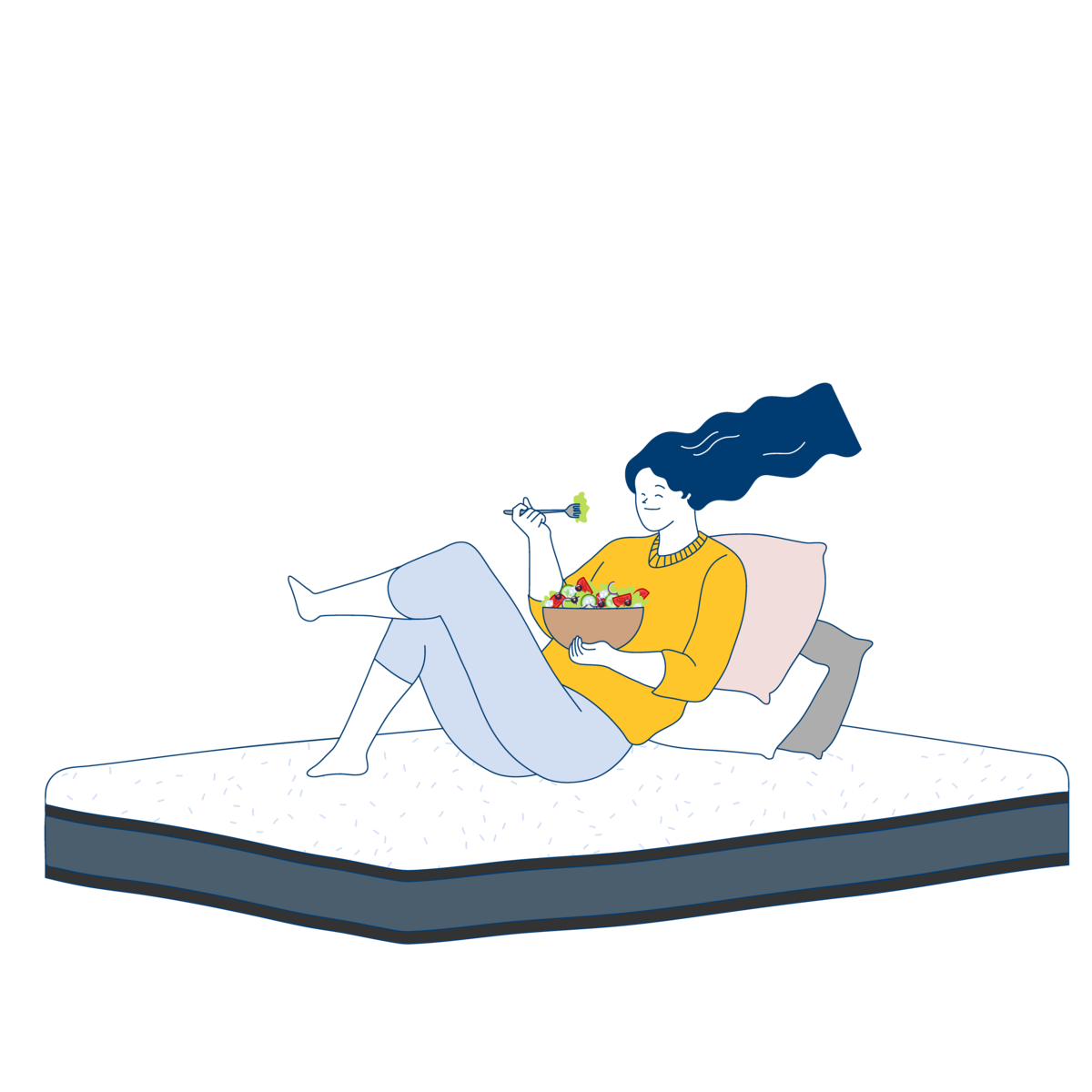Ever wondered if the food you’re eating is affecting your sleep? We’ve brought in qualified nutritionist Jennifer May to talk to us about the importance of sleep and how the foods we eat can play a massive role in how we feel and winding down at night.
As a Nutritionist I believe that restoring healthy, quality sleep is one of the most important factors of our self-care regime. In my book Pure Health & Happiness – 8 Weeks to Change Your Life, I discuss a step by step approach for achieving optimal health and wellbeing. Sleep optimisation is an essential step in this process.
Sleep is where we begin our daily detox, repair damaged tissues and restore balance of fluids in our central nervous system.
A very important benefit of sleep is the effect on immunity. Sleep is a time where our stress hormones and inflammatory proteins are at their lowest level. Our natural killer cells attach to infected cells and neutralise them using a force similar to a magnetic field. This field is disrupted in the presence of inflammation and stress hormones – making quality sleep essential for fighting infection.

Some Outcomes of Poor Sleep:
- Increased inflammation and pain perception.
- Increased sensitivity to food and environmental allergens.
- Increased body fat deposition and cravings for sugar and carbohydrates.
- Reduced immunity as natural killer cells are less able to fight infection.
- Increased overall hunger due to imbalanced hunger-regulating hormones (Ghrelin and Leptin).
- Fatigue and lethargy – the body’s attempt to reduce energy expenditure.
- Fear of activities which further reduce energy (or take you out of your zone of safety). This includes fun activities not just exercise but also socialising, learning or change of any kind.
Top 5 Tips for Improving Sleep
Tip 1: Reduce Stimulants and Support Your Sleep & Energy Naturally
Reduce your intake of sugar, caffeine and/or chocolate after 2pm.
Yes, this includes healthy dark chocolate. The theobromine in chocolate can stimulate dopamine and adrenaline. Use dark chocolate for a mid-morning or post-lunch energy boost.
Alternative: Consume energy boosting foods throughout the day such as cacao or dark chocolate (before 2pm), beetroot, sweet potato and pomegranate.
Supplemental energy support: B Vitamins regulate the sleep wake cycles. Vitamin B3 helps provide an energy boost and helps regulate serotonin (which makes you happy and calm) and melatonin (which helps you sleep). Look for a dose of around 50mg for best results.
Tip 2: Calming Evening Meals
An evening meal containing turkey and potato (or sweet potato) contains high levels of tryptophan (converted into serotonin), vitamin B6 (required for this conversion) and carbohydrates (carry that tryptophan across the blood brain barrier) – making this meal the trifecta.
Tip: If you’re currently on a low carb diet, reintroducing healthy carbs at night as part of a healthy, balanced meal may assist improve sleep.
Protein in each meal maintains optimum energy throughout whilst also ensuring a deep, quality sleep at night. I’ve treated many chronic sleep issues in my clinic simply by increasing protein. Protein sources include: eggs, meat, fish, tofu, legumes, dairy products. Smaller amounts are found in nuts, seeds and vegetables.
Magnesium helps reduce stress and aids muscle relaxation. Dietary sources include leafy greens, blueberries, raw nuts and seeds, quinoa, black beans, figs, prunes and bananas.
It is said that 1 x handful of pistachios per day contains melatonin levels equivalent to a melatonin supplement.
Cherries are said to promote melatonin and serotonin release. Try a cup of warm cherries at night with a drizzle of Greek yoghurt – a delicious way to promote sleepiness.
Tip 3: Reduce Stress-Inducing Activities at Night
This means not checking your finances/writing your to-do list/watching the news/checking up on your ex’s social media feed/watching a scary movie/discussing things which may cause arguments with your partner or housemate/paying bills in the evening before bed.
Tip 4: Introduce a Calming Evening Routine
This could be a hot shower with lavender oil, a meditation session or a light yoga session. For those who need a little more help Calm Breathing may assist.
Calm breathing is slow, regular breathing engaging the diaphragm. Slow, full breaths increase oxygenation which promotes calm.
- Breath in slowly through the nose – into your belly for 4-5 seconds
- Hold for 1 or 2 seconds then exhale slowly through the mouth.
- Wait 3-4 seconds – then repeat
Tip 5: Eat Plenty of Vegetables and Drink Your Water
Hydration largely determines your energy and therefore your ability to maintain a healthy diet and lifestyle. Just 1% dehydration is enough to make you feel fatigued and forgetful. Early signs of dehydration often present as yawning, fatigue, lethargy, sugar cravings and caffeine cravings. If you’re working hard to correct your sleep yet are relying on stimulants to get you through your day due to dehydration – you may be inhibiting your progress.
Vegetables supply not only water but also electrolytes to help your body retain and regulate fluids in your brain, organs, muscles and other essential tissues. Aim to consume 2-3 cups of vegetables with both lunch and dinner and 2l of water daily.
About the Author
Jennifer May is an author, speaker and clinical Nutritionist with a Bachelor of Health Science in Nutritional Medicine. As the Principle Nutritionist & Director of Sydney City Nutritionist and Food Intolerance Australia, Jennifer works directly with patients whilst also mentoring students and new graduates of Nutrition and Dietetics.
Jennifer has created many successful programs to help her patients recover from ongoing illness and major stress including her book Pure Health and Happiness – 8 Weeks to Change Your Life and the Food Intolerance Recovery Program. These programs teach vital strategies to assist with personalising your diet and lifestyle to suit your specific needs, resulting in life-long better health and happiness.



